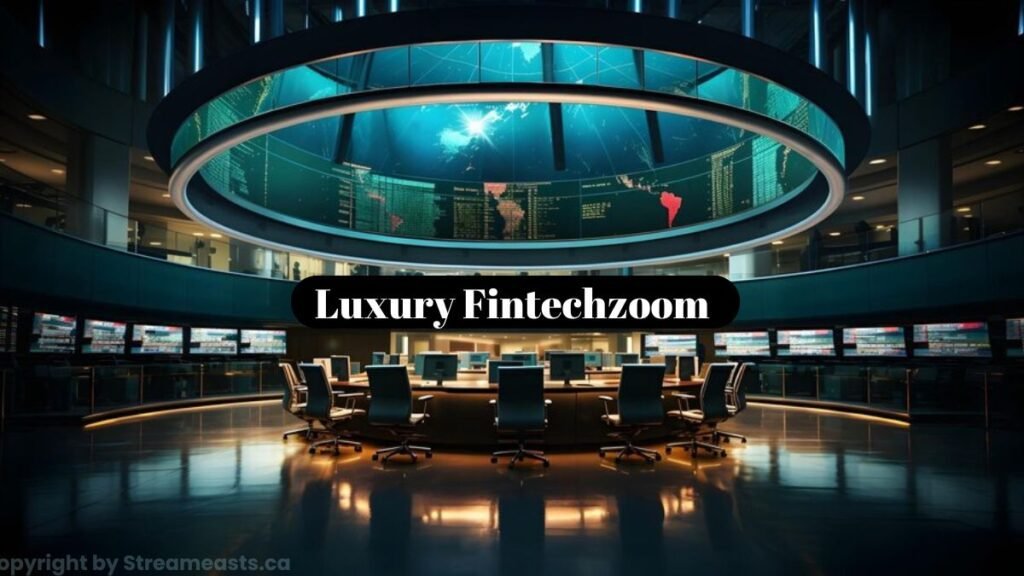In recent years, the intersection of luxury fintechzoom has reshaped how high-end services and products are delivered to consumers. Luxury brands are increasingly leveraging fintech innovations to offer personalized and seamless experiences. From bespoke financial services to exclusive investment opportunities, fintech is making luxury more accessible and engaging. This fusion is not only enhancing customer experiences but also opening up new avenues for businesses to tap into a high-value market segment.
The luxury market is characterized by exclusivity, quality, and a focus on creating memorable experiences. Fintech solutions are helping brands meet these demands by offering sophisticated digital platforms and personalized financial services. Whether it’s through high-end mobile banking, digital wallets tailored for affluent clients, or investment platforms for rare assets, fintech is providing tools that elevate the luxury experience. This article explores how fintech is transforming the luxury sector and what it means for both consumers and businesses.
Table of Contents
The Role of Fintech in Luxury Markets
Fintech, short for financial technology, is revolutionizing how luxury brands interact with their customers. By integrating advanced technology, luxury brands can offer enhanced services such as virtual try-ons, personalized recommendations, and secure transactions. These innovations ensure that customers receive a seamless and exclusive experience, whether shopping online or in-store. Fintech also enables brands to gather data on consumer preferences, allowing for more targeted marketing and product offerings that resonate with their audience.
In addition to improving customer experience, fintech is helping luxury brands expand their reach. Through digital platforms, luxury goods can be accessed by consumers worldwide, breaking geographical barriers that once limited market potential. Blockchain technology, for instance, ensures authenticity and provenance, providing buyers with confidence in their purchases. Furthermore, luxury brands are adopting cryptocurrencies as payment methods, catering to a tech-savvy clientele interested in decentralized finance. These developments highlight the critical role fintech plays in driving innovation and growth within the luxury sector.
Key Players in the Luxury Fintech Landscape
Several key players are at the forefront of the luxury fintechzoom revolution, shaping how high-end services are delivered. Companies like Affirm and Klarna offer buy-now-pay-later options, making luxury products more attainable without compromising exclusivity. These platforms allow customers to purchase high-end items and pay over time, broadening the appeal of luxury brands to a more diverse audience.
Luxury fashion brands such as Gucci and Louis Vuitton are integrating fintech solutions into their business models. They employ digital payment systems, virtual showrooms, and augmented reality to enhance customer interaction and engagement. Fintech startups focusing on wealth management, like Betterment and Wealthfront, are also entering the luxury market, offering tailored investment advice and portfolio management for affluent clients. These companies exemplify how fintech innovations drive the luxury market forward by enhancing accessibility and improving the overall customer experience.
Case Studies: Success Stories of Luxury Fintech
Case Study 1: Burberry’s Digital Transformation
Burberry has successfully integrated fintech solutions to enhance its luxury fintechzoom retail experience. By partnering with tech companies, Burberry has developed an innovative mobile app that offers personalized shopping experiences, including product recommendations based on user preferences. This digital transformation has resulted in a significant increase in customer engagement and sales, illustrating how fintech can elevate luxury brands in the digital age.
Case Study 2: The Role of Blockchain in Authenticity Verification
Luxury fintechzoom watchmaker Audemars Piguet has adopted blockchain technology to ensure the authenticity of its products. By providing digital certificates of authenticity stored on a blockchain, Audemars Piguet offers customers peace of mind, knowing their purchase is genuine. This move has strengthened the brand’s reputation and trust with consumers, showcasing fintech’s potential to solve longstanding issues in the luxury market.
Challenges and Opportunities in Luxury Fintech
Despite its benefits, the integration of fintech in the luxury market presents challenges. Maintaining the exclusivity and personalized experience that defines luxury brands while adopting scalable fintech solutions is a significant hurdle. Brands must carefully balance technology integration with their core values to avoid alienating traditional customers who value personal interaction over digital experiences.
However, these challenges also present opportunities for innovation. Brands that successfully integrate fintech solutions can tap into a growing market of digital-first consumers seeking personalized and efficient luxury fintechzoom experiences. By leveraging data analytics, brands can better understand consumer behavior and preferences, enabling them to tailor products and services to meet evolving demands. The key lies in adopting a customer-centric approach that marries technology with the luxury fintechzoom ethos of exclusivity and personalization.
Future Trends in Luxury Fintech
The future of luxury fintechzoom is promising, with several trends shaping the industry’s evolution. One significant trend is the increasing use of artificial intelligence (AI) to deliver personalized experiences. AI-driven chatbots and virtual assistants are becoming more sophisticated, offering tailored recommendations and support to luxury consumers. This trend aligns with the growing demand for convenience and immediacy in high-end shopping experiences.
Another trend is the rise of sustainable luxury, where fintech plays a crucial role in promoting ethical and transparent practices. Blockchain technology is used to track the supply chain, ensuring products are sourced sustainably and ethically. Additionally, digital platforms are facilitating the resale and rental of luxury goods, appealing to environmentally conscious consumers. These trends indicate that fintech will continue to drive innovation and reshape the luxury fintechzoom market in the coming years.
How to Engage with Luxury Fintech
For consumers interested in exploring luxury fintechzoom, several strategies can enhance their experience. Firstly, consumers should leverage digital platforms and mobile apps luxury brands offer to access personalized services and exclusive offers. These tools often provide a seamless and convenient way to engage with brands and discover new products.
For businesses looking to enter the luxury fintechzoom space, it’s crucial to focus on innovation and customer experience. Brands should invest in technology that enhances the luxury experience without compromising their core values. By embracing fintech solutions such as digital wallets, augmented reality, and blockchain, businesses can differentiate themselves in a competitive market and attract a tech-savvy clientele. Building partnerships with fintech companies can also provide valuable insights and resources to drive growth and success in the luxury fintechzoom market.
Conclusion
In conclusion, the intersection of luxury fintechzoom is creating exciting opportunities for both consumers and businesses. By leveraging technology, luxury brands can offer enhanced experiences, improve accessibility, and drive growth in a competitive market. While challenges exist, the potential for innovation and transformation is immense. As fintech continues to evolve, it will undoubtedly play a pivotal role in shaping the future of luxury, providing consumers with more personalized and engaging experiences than ever before.
Read More : Xewe







